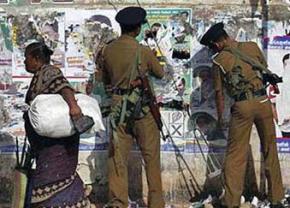Tamils still suffer in Sri Lanka
reports on conditions for oppressed Tamils in Sri Lanka since a new government came to power, in an article for the Australian newspaper Red Flag.
WITHERING HOPES, a report by People for Equality and Relief in Lanka, has detailed ongoing human rights violations against Tamil civilians in the Northeast of Sri Lanka, more than a year after the former secretary of the Sri Lanka Freedom Party (SLFP), Maithripala Sirisena, assumed the presidency and ousted Mahinda Rajapaksa from power in January 2015.
The SLFP under Rajapaksa brutally crushed the secessionist Liberation Tigers of Tamil Eelam, ending the 26-year civil war on 18 May 2009. More than 40,000 Tamils were killed in the final months of the war, and more than a million were displaced.
Since Sri Lanka gained independence in 1948, Tamils have suffered systematic discrimination under the Sinhala Buddhist state.
"The continued atrocities are produced by [the] specific arrangement of political power...connected to the unitary Sri Lankan state apparatus, and the political designs of the Sinhala ruling elites in Colombo," Tamil Diaspora Youth Network member Athithan Jayapalan told Red Flag.

After increasingly authoritarian and Sinhala ultra-nationalist rule under Rajapaksa, Sirisena's victory raised hopes for change as he promised "transitional justice."
Voter turnout for the 2015 elections reached 81.5 percent, a record high according to the Election Commission of Sri Lanka. Tamils voted overwhelmingly for the Tamil National Alliance, which endorsed Sirisena for president.
The elections brought to power a coalition including Sirisena and Rajapaksa loyalists of the SLFP and the right-wing United National Party led by Prime Minister Ranil Wickremesinghe.
Overt surveillance by security forces decreased in Tamil-dominated areas. But change was limited.
"The anti-terrorist mechanism [under the Prevention of Terrorism Act 1978] that was so ferocious under Rajapaksa is still there," Alan Keenan, Sri Lanka specialist at the International Crisis Group, told the New York Times. "People can complain more freely but the apparatus that watches them closely and harasses people remains."
Last year, Tamils demanded the release of political prisoners, information on disappeared persons and the return of land forcibly appropriated by the military. Despite government bans, people turned out for the largest and most widespread commemorations of Tamil war dead since the civil war ended.
In October, the Sirisena government co-sponsored resolution 30/1 for the UN Human Rights Council in Geneva, proposing a South Africa-style reconciliation commission to investigate war crimes and the adoption of a new constitution to establish a constituent assembly.
Foreign Minister Mangala Samaraweera said that reform "may not be as fast as some may want it to be," but the president and prime minister had "the political will and the courage of their convictions to ensure that we take the country forward."
Addressing Sri Lankans on Independence Day this year, Sirisena announced that the national unity government would "safeguard the dignity of the country, the people and the soldiers...[and] get international recognition for our military."
That month, former Field Marshal Sarath Fonseka was appointed to the cabinet. His forces were implicated in the shelling of civilians and hospitals, sexual violence and summary execution of war prisoners in the final months of the civil war.
This year's defense expenditures are expected to exceed 2014's by more than 20 billion Sri Lankan rupees ($140 million). Since the end of the civil war, the Northeast has been under occupation, and Sri Lanka's 300,000-strong military has increased its involvement in civilian life, including education, property development and the construction of infrastructure.
"The government will not demilitarize our homeland because they...[want to] forcibly assimilate us into their idea of a Sri Lankan identity," a 45-year-old Tamil woman from Batticaloa told People for Equality and Relief in Lanka.
The unitary Sri Lankan state and entrenched Sinhala Buddhist nationalism inherent in its policies are rationalized as a necessary defense against the existential threat posed by the Tamil people's collective identity.
As Jayapalan put it to Red Flag: "How can abuses cease, and Tamils live democratically in liberty, self-determination and with justice, when the very structures of oppression persist?"
First published at Red Flag.


